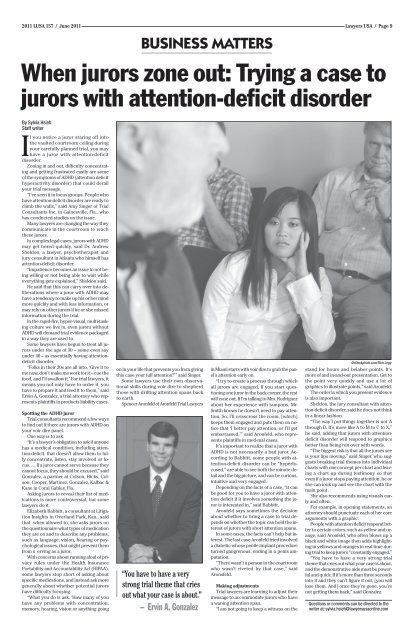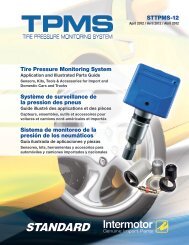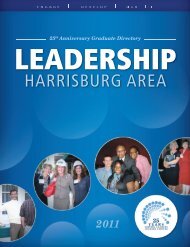NICU – Neonatal Intensive Care - Digital Publishing
NICU – Neonatal Intensive Care - Digital Publishing
NICU – Neonatal Intensive Care - Digital Publishing
You also want an ePaper? Increase the reach of your titles
YUMPU automatically turns print PDFs into web optimized ePapers that Google loves.
2011 LUSA 157 / June 2011 Lawyers USA / Page 9BUSINESS MATTERSWhen jurors zone out: Trying a case tojurors with attention-deficit disorderBy Sylvia HsiehStaff writerIf you notice a juror staring off intothe vaulted courtroom ceiling duringyour carefully planned trial, you mayhave a juror with attention-deficitdisorder.Zoning in and out, difficulty concentratingand getting frustrated easily are someof the symptoms of ADHD (attention deficithyperactivity disorder) that could derailyour trial message.“I’ve seen it in focus groups. People whohave attention-deficit disorder are ready toclimb the walls,” said Amy Singer of TrialConsultants Inc. in Gainesville, Fla., whohas conducted studies on the issue.Many lawyers are changing the way theycommunicate in the courtroom to reachthese jurors.In complex legal cases, jurors with ADHDmay get bored quickly, said Dr. AndrewSheldon, a lawyer, psychotherapist andjury consultant in Atlanta who himself hasattention-deficit disorder.“Impatience becomes an issue in not beingwilling or not being able to wait whileeverything gets explained,” Sheldon said.He said that this can carry over into deliberationswhere a juror with ADHD mayhave a tendency to make up his or her mindmore quickly and with less information, ormay rely on other jurors if he or she missedinformation during the trial.In the rapid-fire, hyper-visual, multi-taskingculture we live in, even jurors withoutADHD will demand trial evidence packagedin a way they are used to.Some lawyers have begun to treat all jurorsunder the age of 30 <strong>–</strong> some even sayunder 40 <strong>–</strong> as essentially having attentiondeficitdisorder.“Folks in their 30s are all into, ‘Give it tome now, don’t make me work for it <strong>–</strong> cue thefood, and I’ll swallow it.’ For trial lawyers, itmeans you not only have to order it, youhave to prepare it and feed it to them,” saidErvin A. Gonzalez, a trial attorney who representsplaintiffs in products liability cases.Spotting the ADHD jurorTrial consultants recommend a few waysto find out if there are jurors with ADHD onyour voir dire panel.One way is to ask.“It’s a lawyer’s obligation to ask if anyonehas a medical condition, including attention-deficit,that doesn’t allow them to fullyconcentrate, listen, stay involved or focus.… If a juror cannot serve because theycannot focus, they should be excused,” saidGonzalez, a partner at Colson, Hicks, Colson,Cooper, Martinez, Gonzalez, Kalbac &Kane in Coral Gables, Fla.Asking jurors to reveal their list of medicationsis more controversial, but somelawyers do it.Elizabeth Babbitt, a consultant at LitigationInsights in Overland Park, Kan., saidthat when allowed to, she asks jurors onthe questionnaire what types of medicationthey are on and to describe any problems,such as language, vision, hearing or psychologicalissues, that might prevent themfrom s erving as a juror.With concerns about running afoul of privacyrules under the Health InsurancePortability and Accountability Act (HIPAA),some lawyers stop short of asking aboutspecific medications, and instead ask moregenerally about whether potential jurorshave difficulty focusing.“What you do is ask, ‘How many of youhave any problems with concentration,memory, hearing, vision or anything goingon in your life that prevents you from givingthis case your full attention?’” said Singer.Some lawyers use their own observationalskills during voir dire to shepherdthose with drifting attention spans backto earth.Spencer Aronfeld of Aronfeld Trial Lawyers“You have to have a verystrong trial theme that criesout what your case is about.”<strong>–</strong> Ervin A. Gonzalezin Miami starts with voir dire to grab the panel’sattention early on.“I try to create a process through whichall jurors are engaged. If you start questioningone juror in the back corner, the restwill zone out. If I’m talking to Mrs. Rodriguezabout her experience with tampons, Mr.Smith knows he doesn’t need to pay attention.So, I’ll crisscross the room, [which]keeps them engaged and puts them on noticethat ‘I better pay attention, or I’ll getembarrassed,’” said Aronfeld, who representsplaintiffs in med-mal cases.It’s important to realize that a juror withADHD is not necessarily a bad juror. Accordingto Babbitt, some people with attention-deficitdisorder can be “hyperfocused,”are able to see both the minute detailand the big picture, and can be curious,intuitive and very engaged.Depending on the facts of a case, “it canbe good for you to have a juror with attentiondeficit if it involves something the juroris interested in,” said Babbitt.Aronfeld says sometimes the decisionabout whether to bring a case to trial dependson whether the topic can hold the interestof jurors with short attention spans.In some cases, the facts can’t help but interest.The last case Aronfeld tried involveda diabetic whose penile implant procedureturned gangrenous, ending in a penis amputation.“There wasn’t a person in the courtroomwho wasn’t riveted by that case,” saidAronsfeld.Making adjustmentsTrial lawyers are learning to adjust theirmessage to accommodate jurors who havea waning attention span.“I am not going to keep a witness on the©iStockphoto.com/Rich Leggstand for hours and belabor points. It’smore of and in-and-out presentation. Get tothe point very quickly and use a lot ofgraphics to illustrate points,” said Aronfeld.The order in which you present evidenceis also important.Sheldon, the jury consultant with attention-deficitdisorder, said he does not thinkin a linear fashion.“The way I put things together is not Athrough D. It’s more like A to M to C to X,”he said, adding that jurors with attentiondeficitdisorder will respond to graphicsbetter than being run over with words.“The biggest risk is that all the jurors seeis your lips moving,” said Singer, who suggestsbreaking trial themes into individualcharts with one concept per chart and leavinga chart up during testimony so thateven if a juror stops paying attention, he orshe can look up and see the chart with themain point.She also recommends using visuals earlyand often.For example, in opening statements, anattorney should punctuate each of her corearguments with a graphic.People with attention deficit respond betterto certain colors, such as yellow and orange,said Aronfeld, who often blows up ablack and white image then adds highlightingin yellows and oranges in real time duringtrial to keep jurors “constantly engaged.”“You have to have a very strong trialtheme that cries out what your case is about,and the demonstrative aids must be powerfuland quick. If it’s more than three secondsinto it and they can’t figure it out, [you willlose them. And] once they’re gone, you’renot getting them back,” said Gonzalez.Questions or comments can be directed to thewriter at: sylvia.hsieh@lawyersusaonline.com
















